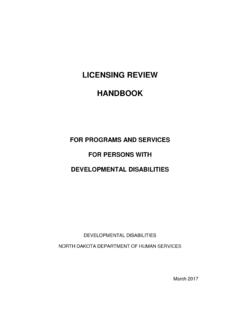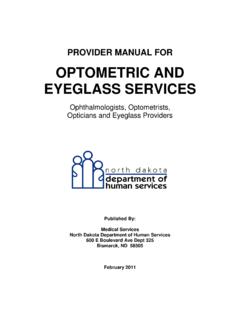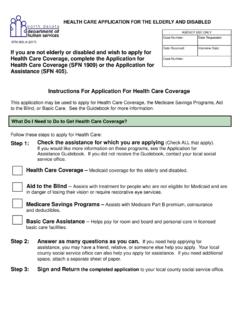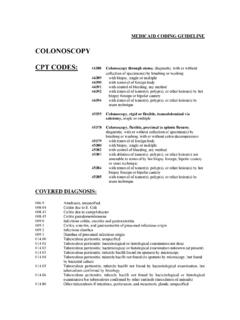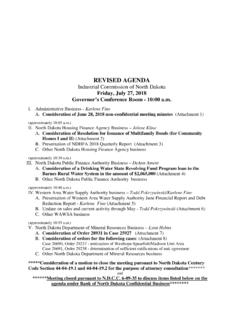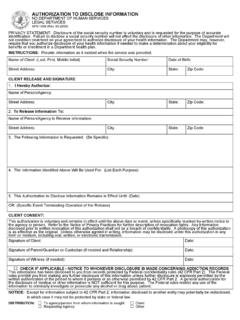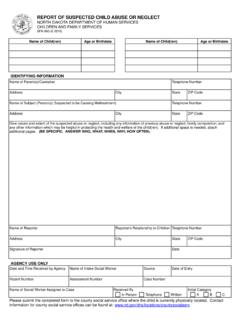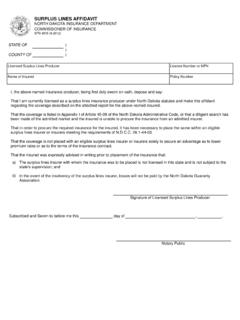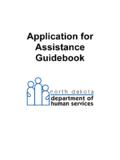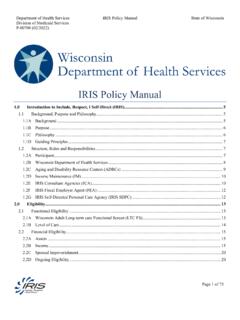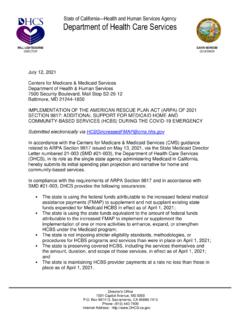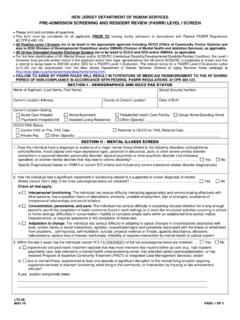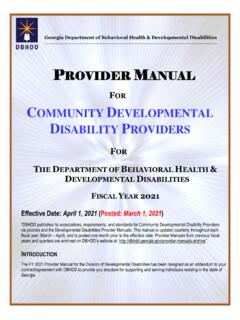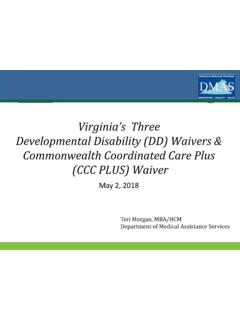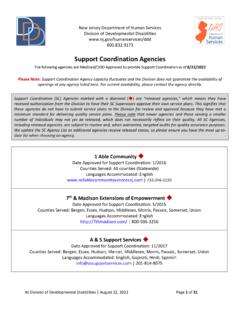Transcription of CRITICAL INCIDENT REPORTING POLICY DEPARTMENT OF …
1 This document was developed under grant CFDA from the DEPARTMENT of Health and Human services , Centers for Medicare & Medicaid services . However, these contents do not necessarily represent the POLICY of the DEPARTMENT of Health and Human services , and you should not assume endorsement by the Federal Government. Award # 1 LICMS030171/01 CRITICAL INCIDENT REPORTING POLICY DEPARTMENT OF HUMAN services MEDICAL services DIVISION - MFP DN 533 (8-2008) Page 1 of 6 General Definition A CRITICAL INCIDENT is any actual or alleged event or situation that creates a significant risk of substantial or serious harm to the physical or mental health, safety or well being of a waiver participant.
2 Reportable CRITICAL Incidents Defined 1. Abuse 2. Neglect 3. Exploitation 4. Rights Violations 5. Serious Injury 6. Missing Person 7. Death 8. Medical Emergency 9. Restraints 10. Medical Errors 11. Law Enforcement Contact 12. Suicide Attempt Who is supposed to report a CRITICAL INCIDENT ? Any person who becomes aware of a CRITICAL INCIDENT as defined on this form. Qualified Service Providers that are enrolled with the DEPARTMENT of Humans services , Transition Coordinators, and Case Managers are required to report incidents How do you report a CRITICAL INCIDENT ?
3 Individuals wishing to report an INCIDENT can contact any of the following persons: Transition Coordinator: Name _____ Agency_____ Address_____ Phone Number_____ Case Manager: Name _____ Agency_____ Address_____ Phone Number_____ Money Follows the Person Grant Manager: Jake Reuter, DEPARTMENT of Humans services , Medical services , DEPARTMENT 325, 600 East Boulevard Ave, Bismarck, ND 58505, 1-800-755-2604. REPORTING Process The CRITICAL incidents report form (SFN 536) will be completed by either the Transitional Coordinator, Case Manager, or the Money Follows the Persons Grant Program Manager.
4 Action will be taken to resolve the concerns and a follow-up plan will be developed. This document was developed under grant CFDA from the DEPARTMENT of Health and Human services , Centers for Medicare & Medicaid services . However, these contents do not necessarily represent the POLICY of the DEPARTMENT of Health and Human services , and you should not assume endorsement by the Federal Government. Award # 1 LICMS030171/01 CRITICAL INCIDENT REPORTING POLICY DEPARTMENT OF HUMAN services MEDICAL services DIVISION - MFP DN 533 (8-2008) Page 2 of 6 CRITICAL Incidents 1.
5 A b u s e a. Willful use of offensive, abusive, or demeaning language by a caretaker that causes mental anguish of any person with developmental disabilities; b. Knowing, reckless, or intentional acts or failures to act which cause injury or death to a developmentally disabled or mentally ill person or which placed that person at risk of injury or death; c. Rape or sexual assault of a developmentally disabled or mentally ill person; d. Corporal punishment or striking of a developmentally disabled or mentally ill person; e. Unauthorized use or the use of excessive force in the placement of bodily restraints on a developmentally disabled or mentally ill person; and f.
6 Use of bodily or chemical restraints on a developmentally disabled or mentally ill person which is not in compliance with federal or state laws and administrative regulations. 2. Exploitation An act committed by a caretaker or relative of, or any person in a fiduciary relationship with, a person w ith a disability, means: a. The taking or misuse of property or resources of a person with developmental disabilities or mental illness by means of undue influence, breach of fiduciary relationship, deception, harassment, criminal coercion, theft, or other unlawful or improper means; b.
7 The use of the services of a person with developmental disabilities or mental illness without just compensation; or c. The use of a person with developmental disabilities or mental illness for the entertainment or sexual gratification of others under circumstances that cause degradation, humiliation, or mental anguish to the person with developmental disabilities or mental illness. 3. Neglect a. Inability of a person with disabilities to provide food, shelter, clothing, health care, or services necessary to maintain the mental and physical health of that person; b.
8 Failure by any caretaker of a person with developmental disabilities or mental illness to meet, either by commission or omission, any statutory obligation, court order, administrative rule or regulation, POLICY , procedure, or minimally accepted standard for care of persons with developmental disabilities or mental illnesses; This document was developed under grant CFDA from the DEPARTMENT of Health and Human services , Centers for Medicare & Medicaid services . However, these contents do not necessarily represent the POLICY of the DEPARTMENT of Health and Human services , and you should not assume endorsement by the Federal Government.
9 Award # 1 LICMS030171/01 CRITICAL INCIDENT REPORTING POLICY DEPARTMENT OF HUMAN services MEDICAL services DIVISION - MFP DN 533 (8-2008) Page 3 of 6 c. Negligent act or omission by any caretaker which causes injury or death to a person with developmental disabilities or mental illness or which places that person at risk of injury or death; d. Failure by any caretaker, who is required by law or administrative rule, to establish or carry out an appropriate individual program or treatment plan for a person with developmental disabilities or mental illness; e.
10 Failure by any caretaker to provide adequate nutrition, clothing, or health care to a person with developmental disabilities or mental illness; f. Failure by any caretaker to provide a safe environment for a person w i t h developmental disabilities or mental illness; and g. Failure by any caretaker to provide adequate numbers of appropriately trained staff in its provision of care and services for persons with developmental disabilities or mental illnesses. 4. Rights Violations Through omission or commission, the failure to comply with the rights to which an individual with a disability is entitled as established by law, rule, regulation, or POLICY .
